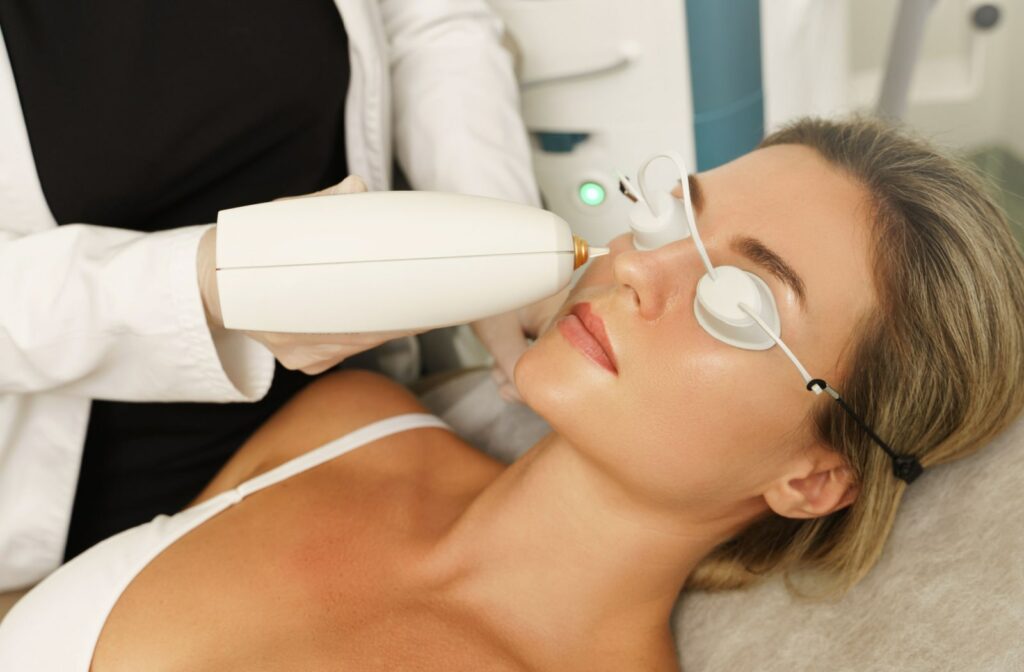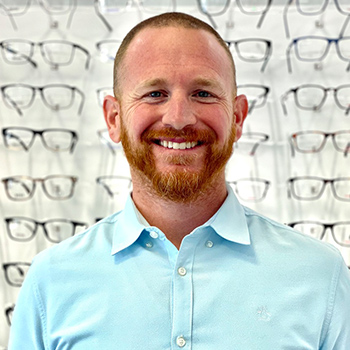Dry eyes may sound like a minor inconvenience, but they can be disruptive to your work, academics, and leisure time. Dry eye can occur when your eyes don’t produce sufficient tears to stay lubricated or the tears evaporate too rapidly. The result is often discomfort, irritation, and vision problems that affect your quality of life.
In recent years, optometrists have embraced a technology long-used in other medical spheres—a noninvasive and effective treatment called intense pulsed light therapy (IPL). IPL is a dry eye therapy that uses precisely calibrated light directed to the meibomian glands to break down blockages and restore healthy oil production.
What Causes Dry Eye?
Many factors can cause dry eye, including:
- Aging: As you grow older, your eyes tend to produce fewer tears.
- Environmental factors: Exposure to smoke, wind, and dry climates can all contribute to dry eye.
- Medical conditions: Rheumatoid arthritis, lupus, diabetes, and thyroid disorders are just some of the many conditions that can increase your risk of developing dry eye.
- Medications: Some medications, such as antihistamines, decongestants, birth control, and antidepressants, can interfere with tear production.
- Contact lens wear: Wearing contact lenses for extended periods can disrupt the normal tear film and lead to dry eye.
Symptoms of Dry Eye
Dry eye can cause a range of irritating symptoms that are near-impossible to ignore. The most common symptoms of dry eye include:
- Scratchy, gritty, or burning sensations
- Redness
- Blurry vision
- Sensitivity to Light
- Excessive tearing
When left untreated, these symptoms can lead to eye fatigue, discomfort, and difficulty wearing contact lenses, which can seriously impact your quality of life.
What Is IPL Therapy?
IPL dry eye therapy is a non-surgical, noninvasive procedure that uses pulses of light to penetrate deep into the skin surrounding the eyes. The light interacts with the cells in the skin and stimulates the production of natural oils and tears, which can help lubricate and moisturize the eyes.
For dry eye caused by meibomian gland dysfunction—where the oil glands are blocked and can’t produce fresh oil for the tear mixture—IPL can be a significant help in breaking down the obstruction to promote a healthy tear balance. At Dr. Bittel Optometry, we use OptiLight by Lumenis IPL.
OptiLight by Lumenis is a light-based, noninvasive treatment done in the area below the eyes to manage dry eye. The first and only IPL FDA-approved for dry eye management.
The treatment is safe, gentle, and is backed by more than 20 clinical studies.
How Does It Work?
OptiLight uses precise pulses of light to reduce the inflammation that is typically associated with dry eye disease, improve tear break-up time, and increase meibomian gland functionality.
This application can significantly relieve dry eye indicators and has a multi-factorial effect, including:
- Increasing tear break-up time
- Reducing the amount of Demodex mites and bacteria living around your eyes
- Eliminating blood vessels that contribute to inflammation
- Improving meibomian gland functionality
What Are the Benefits of IPL Treatment for Dry Eye?
One of the primary advantages of IPL treatment for dry eye is that it’s noninvasive and requires no downtime following the procedure. Unlike traditional methods for treating dry eye, such as eyedrops and ointments, which provide only temporary relief, IPL can provide long-lasting results.
Many patients report improved eye comfort and an overall increase in the quality of their lives after completing the treatment.
Supplementary Treatments for Dry Eye
There are several supplementary treatments available to help manage dry eye symptoms, including:
- Artificial tears: Over-the-counter eye drops, gels, and ointments can help to lubricate your eyes.
- Prescription eye drops: Your optometrist may recommend prescription eye drops that are designed to treat dry eye.
- Punctal plugs: These tiny devices can be placed in your tear ducts to help retain tears, keeping them lubricated.
- Omega-3 fatty acids: Omega-3 can help support healthy meibomian gland function, promoting healthy tear production. Not all omega-3 supplements are equal, so talk to your optometrist for recommendations.
- Lifestyle changes: Simple changes to your lifestyle, such as taking breaks from screen time, avoiding smoke and wind, and drinking plenty of water, can also help to manage dry eye.
Find Lasting Dry Eye Relief in Yorba Linda
IPL dry eye treatment is a revolutionary treatment that can provide long-lasting relief for dry eye disease. If you’re experiencing dry eye symptoms, seek advice from the eye care professionals at Dr. Bittel Optometry by booking an appointment.
We can help to determine the underlying cause of your dry eye symptoms and recommend treatments like IPL, depending on your specific symptoms. With the right treatments carried out by our dedicated optometrists, you can find lasting relief from dry eye.


